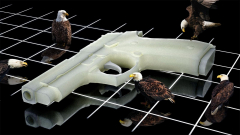The world’s biggest social media sites are home to thousands of 2nd Amendment devotees who believe anyone should be able to use a 3D printer to build their own gun. Meta, Discord and the DOJ are trying—and mostly failing—to contain it.
Apink uzi. A leopardskin handgun with a golden scope. A rifle designed to look like it’s from the Halo videogame. A multicolor toy assault rifle, made for a four-year-old’s birthday.
These aren’t the kinds of guns you can buy off the rack. They were built at home, with 3D printers, evidence of a burgeoning online community where enthusiasts imagine, design and literally print out the guns of their dreams and then share the results online. Tens of thousands of users have joined private social media groups on Facebook, Discord and other sites to share their latest handgun creation, offer tips on how to print weapons and commiserate about anti-gun laws. Many of these so-called “3D2A” groups are run by 2nd amendment absolutists who say that they’re exercising their constitutional rights and participating in an increasingly popular American pastime; like an arts and crafts community, but for deadly weapons.
“If you can go to the library and get a book about how to build a gun, you should be able to do the same thing online,” says Todd Kelly, who helped set up the 2A Printing Facebook group with over 60,000 members. He describes the gun designs posted in the group as “art” that amounts to free speech, and is explicit about his political aims. “Our goal in the 3D printed community is that no government will ever be able to tell someone that they cannot have a gun.”
“As soon as you are collecting at that scale, you are inevitably collecting information from people who are just curious.”
But the movement is up against the twin enforcers of social media companies and the government. Often, the groups are banned for posts that appear to facilitate weapons sales or are mistakenly identified by moderators as such, a practice outlawed across most major social platforms, including Facebook, Discord and Reddit. The Justice Department is also keeping tabs on their activity. Federal agents raided a now-defunct Discord group called the 2A Print Depot in 2024, seizing “group members’ chats and data links” for a nearly 18 month stretch beginning in June 2023, according to a search warrant reviewed by Forbes. Two administrators of a group with the same name on Facebook also had their accounts searched, the warrant said. Agents similarly looked into communications between members of Kelly’s Facebook group. The warrant also said federal investigators have run undercover profiles in at least one of the private groups, which require users to apply for entry, through to 2025.
The warrant said that at least one user was a convicted felon, and appeared to be posting images of themselves illegally using a firearm. Two of the five group administrators named in the warrant have been charged, one for being a felon in ownership of a firearm, another for failing to register their 3D-printed rifle. Both have pleaded not guilty.
The concern among social sites and lawmakers is understandable, given the barrage of shootings in America over the last year, one of which —the murder of UnitedHealthcare CEO Brian Thompson, in December 2024—was allegedly perpetrated with a 3D-printed weapon, also known as a ghost gun. Since 2013, when an organization called Defense Distributed made the world’s first almost-entirely 3D-printed gun, there’s been a rising anxiety around the proliferation of the weapons, largely because they’re not traceable like firearms manufactured by accredited companies like Glock or Remington. It’s led to a hodgepodge of laws governing their creation. Federally, as long as the gun is for personal use and not to be sold, it’s legal to print them. In some states—including Delaware, New Jersey and Rhode Island—it’s a crime to either print guns and their parts or to share designs and distribute unserialized weapons, meaning some group member activities could be deemed illegal in those parts of America. Anti-gun hardliners like Everytown For Gun Safety, a nonprofit advocating gun control, believe updating the law to fully ban 3D printed weapons is one of the best ways to counter the threat.
Got a tip on Big Tech’s role in surveillance? Contact the reporter, Thomas Brewster, at tbrewster@forbes.com or +1 929-512-7964 on Signal.
There’s no doubt criminals are availing themselves of unregistered, untraceable ghost guns. Earlier this year, in a previously-unreported case, an individual in Granby, Connecticut was charged after making threats to use explosive devices on New Year’s Eve in 2024. When federal agents raided his home and his electronics, they found a 3D printer and evidence he’d been building a sizable arsenal, in part by manufacturing multiple firearm parts based on designs from dark web sites. He’s been charged with firearms trafficking, as well as unlawful possession of machine guns and a silencer. He has pleaded not guilty.
The admins and moderators of 3D2A groups try to distance themselves from such associations by maintaining strict rules. The Black Lotus Coalition, in which more than 20,000 followers across Facebook and Discord share and test 3D-printed gun designs, has explicit policies requiring compliance with the law, along with civility and no abuse or bullying. Black Lotus founder Gage Moran said he





